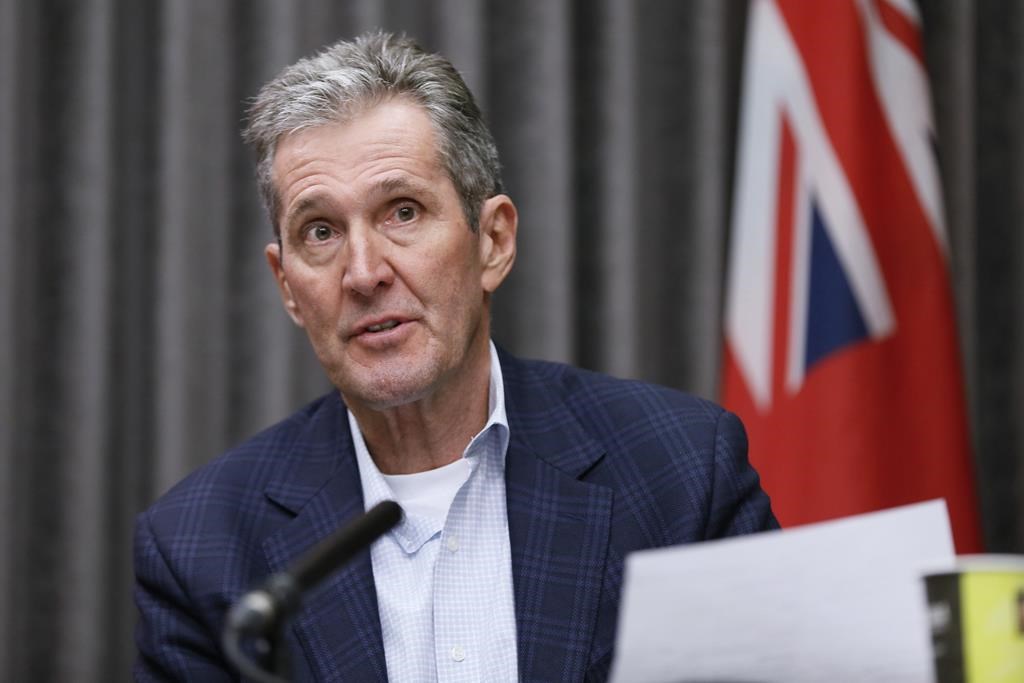The president of the Manitoba Chambers of Commerce says he’s frustrated by Manitoba’s record-high COVID-19 cases and their impact on the community.

“I never thought it would get to this. I didn’t think we’d be getting to the point where we had to close businesses again,” Chuck Davidson told 680 CJOB.
“I really feel for those businesses and the stress they’ve been under for the past eight months, just to know today that they’ve got to close their doors, for hopefully only a two-week time frame.
“It’s a real tough day for business in Manitoba.”
The province set a staggering new record Friday, with the announcement of 480 new COVID-19 cases, as health officials announced tough new public health orders, which include code red restrictions for Winnipeg.
Manitoba’s top doctor announced the tightened restrictions at a live COVID-19 update Friday.
“We have pleaded with Manitobans to follow the fundamentals and to significantly reduce their contacts, and the numbers continue in the wrong direction,” said Dr. Brent Roussin, Manitoba’s chief public officer of health.
In Winnipeg, bars and restaurants will close except for take-out and delivery and most retail will be reduced to 25 per cent capacity. Sports and recreation programming will be suspended and gyms and fitness centres will have to cut capacity to 25 per cent.
Movie theatres and concert halls will be closed, while faith-based gatherings are reduced to 15 per cent, or 100 people, whichever is lower.

Davidson said the city’s business community saw the numbers and the direction they were headed, but a big part of the frustration stems from business having to close or reduce their capacity, despite following all of the safety protocols.
“I think the reality that we’ve known with the business community in Manitoba is that right from the beginning, they understood that they had to put in placed those protocols, and they were following them — they were ahead of the game,” he said.

Get weekly health news
“That’s what’s so frustrating with this — you’re not seeing the cases as a result of businesses being open, that’s not where the cases are happening. It’s happening with group settings, it’s happening where people — there’s no question about it — got a little too comfortable.”

Manitobans expressed their frustration on social media, with most casting blame on premier Brian Pallister and his government’s Restart MB strategy — a $250,000 advertising campaign launched in the summer, with the intention of reopening the province for business.
Tweets Friday ran the gamut from criticizing the province’s use of resources to calling for Pallister to resign.
Manitoba Nurses Union (MNU) president Darlene Jackson said in a statement that the harsher measures are necessary, but that more investment needs to be made to support the province’s already-strained health-care workers.
“Even in today’s announcement, there is no investment to bolster the number of health-care professionals. To support those already in the system, the government must create a central, rapid intake, and we need to incentivize recruitment and retention,” she said.
“Other jurisdictions have made investments to recruit and retain nurses in a variety of ways. Ontario has invested more than $50 million to support their recruitment efforts.”
“Manitoba has done nothing of the sort, and we’re hearing from nurses that are still struggling to get into the system to help.”
Jackson said the province also needs to ensure that front-line health workers have access to necessary personal protective equipment (PPE), amid reports of equipment shortages.
In a brief statement Friday afternoon, Pallister said his government intends to continue following the advice of public health experts.
“It is our hope that these new measures will help slow the spread of this virus and ensure our health-care system is there for all Manitobans, when they need it,” he said.
“We all have a role to play in protecting ourselves and our loved ones, and I encourage all Manitobans to act now and significantly reduce their number of close contacts and follow the fundamentals.
“We recognize the significant personal and professional sacrifices Manitobans have made to help protect themselves and their community. We are in this together, and I confident we will get through this together.”
Questions about COVID-19? Here are some things you need to know:
Symptoms can include fever, cough and difficulty breathing — very similar to a cold or flu. Some people can develop a more severe illness. People most at risk of this include older adults and people with severe chronic medical conditions like heart, lung or kidney disease. If you develop symptoms, contact public health authorities.
To prevent the virus from spreading, experts recommend frequent handwashing and coughing into your sleeve. They also recommend minimizing contact with others, staying home as much as possible and maintaining a distance of two metres from other people if you go out. In situations where you can’t keep a safe distance from others, public health officials recommend the use of a non-medical face mask or covering to prevent spreading the respiratory droplets that can carry the virus. In some provinces and municipalities across the country, masks or face coverings are now mandatory in indoor public spaces.
–With a file from Shane Gibson














Comments
Want to discuss? Please read our Commenting Policy first.